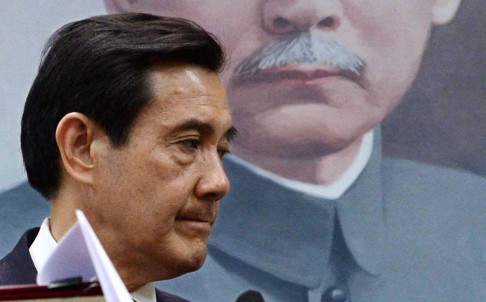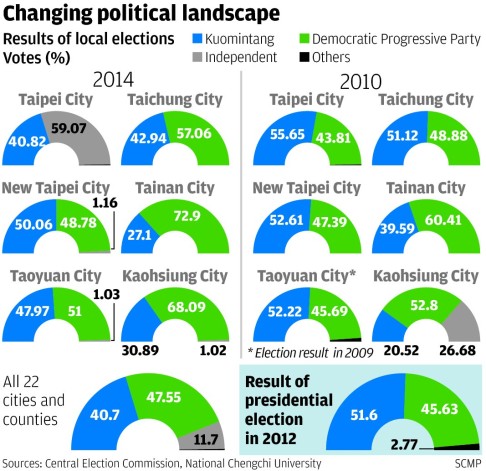- Joined
- Jul 23, 2012
- Messages
- 266
- Points
- 0
Ma Ying-jeou expected to quit as KMT chairman after election disaster
President's resignation as chairman likely to spark power struggle in party, say analysts
PUBLISHED : Sunday, 30 November, 2014, 2:33pm
UPDATED : Monday, 01 December, 2014, 2:50am
Lawrence Chung in Taipei [email protected]

President Ma Ying-jeou at KMT headquarters. Photo: Kyodo
Taiwanese President Ma Ying-jeou was expected to resign as chairman of the ruling Kuomintang to take full responsibility for the party's crushing defeat in Saturday's local elections, party officials said yesterday.
Analysts said the move would set off a new power struggle within the party and erode the KMT's chances in the 2016 presidential poll if the infighting persisted.
They also said that although the weekend elections were local contests, both the KMT and Beijing had to be prepared for the results to have some fallout on cross-strait relations.
Taiwan's ruling party suffered its worst electoral setback since coming to power in 1949, losing nine of the 15 cities and counties it used to control, in what analysts saw as voter payback for the Ma team's poor economic and administrative showing.
The defeats prompted Premier Dr Jiang Yi-huah and KMT secretary general Tseng Yung-chuan to quit - with more resignations expected to follow.
Jiang and 81 other cabinet members would step down en masse today, cabinet spokesman Sun Lih-chyun said yesterday.
So far, Ma has only apologised for the defeats, stopping short of saying if he will give up the party chairmanship, prompting criticism from KMT mavericks, including some legislators.

But KMT spokesman Charles Chen Yi-hsin told the Post that Ma "will not cling on to the post" and "will not shirk any responsibility he should take", adding: "The chairman will make an important announcement during the KMT central standing committee meeting this Wednesday over the responsibility issue."
He said the committee would discuss steps to take in the future and the outcome of such decisions "would be jointly shouldered by all those present".
Vice-President Wu Den-yih, the first vice-chairman of the KMT, was expected to take over as acting party chief.
George Tsai Wei, a political science professor at Chinese Culture University in Taipei, said Ma's resignation as party leader would not only signal the start of a "lame duck" period for him, but would also set off a fierce power struggle within the party.
"Local faction leaders and KMT stalwarts unhappy with Ma will team up to form a power centre," Tsai said, adding that "a power transition in 2016 would be inevitable" if the KMT could not keep the infighting in check.
The results would also affect the KMT's capacity to represent Taiwan in dealings with the mainland but would have a limited direct impact on cross-strait relations because the elections were essentially local affairs, according to Liu Guoshen , director of Xiamen University's Taiwan Research Institute.
Professor Wu Hsin-hsing, of Ming Chuan University in Taipei, disagreed, saying the election outcomes more or less reflected Taiwanese voters' worries about Ma's cross-strait policy.
"As a lame duck, Ma is certain to slow down his pace in pushing for his cross-strait policy before his term ends in 2016," Wu said.
Tsai also said the outcome would prompt Beijing to reconsider its economic sweetening policy towards Taiwan, given the negative response from the island's voters.
But Liu said the mainland would prefer to consummate outstanding trade deals, including the stalled services trade agreement, before 2016.
Additional reporting by Zhuang Pinghui
